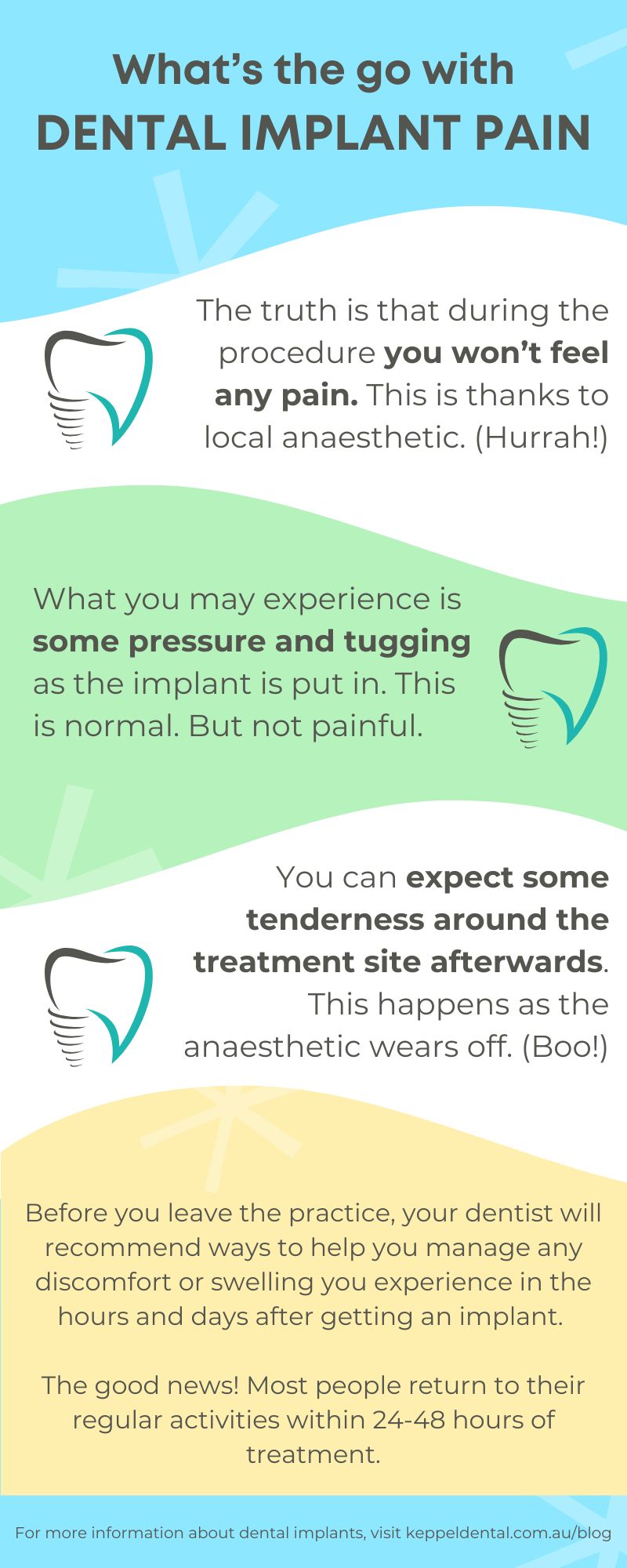Modern dentistry focuses heavily on making your time in the chair as comfortable as possible. Sadly, though, many patients still carry memories of outdated dental practices that caused them discomfort and pain. These memories and associations are so strong that they trigger an automatic worry that all oral health procedures will hurt.
So it’s no wonder that committing to dental treatment that involves some level of dental surgery, such as getting dental implants, can raise some painful questions. It’s natural to want to know, how much pain and for how long?
This is a fair question. It’s rare for people to willingly put themselves through pain. And pay thousands for the privilege. So on a scale of ‘totally painless ’ to ‘get me the heck out of here’, what can you expect when you have a dental implant or full mouth implants?
The good news: you’ll feel very little pain during the procedure
Inserting a dental implant means placing a titanium screw-like fitting into the jaw bone. This is the implant and it works a lot like a natural tooth’s root.
To place the implant without causing you any discomfort, we numb the area with a local anaesthetic. Work to fit the dental implant only begins once the anaesthetic has kicked in, so during the procedure you’ll feel very little.
What some people do experience—and may confuse with pain—is pressure and movement as the implant is fitted. This can be a little uncomfortable or feel forceful.

What to expect after the procedure
As the anaesthetic wears off, you can expect some tenderness around the treatment site. This should pass within a day or less, although some people can experience discomfort around the treatment site for 2-3 days. Certainly within a week, as healing progresses and any bleeding around the site stops, your mouth should feel almost back to normal.
It’s also fairly common to experience
- minor bruising around your jawline, depending on where the implant was fitted
- some swelling around the gums and face
- jaw ache or soreness.
Most patients can return to their regular daily activities 24-48 hours after the procedure. The single (and temporary) difference being how they chew their food. Eating on the opposite side of the mouth to where they had treatment will feel better.
The mouth can heal very quickly. It takes a bit longer for the bone to fuse to the implant. This can take 3-4 months, but you definitely shouldn’t be feeling any pain or discomfort as that happens.
Managing any discomfort
Before you leave the practice, your dentist will talk to you about pain relief options and what you can do at home to help with the healing process. Recommendations depend on:
- your general health
- any other medications you’re taking
- what your dentist expects you to encounter based on the position of the implant in your mouth
- how many implants have been fitted.
When to see your dentist about implant pain
As mentioned above, most discomfort and tenderness should ease or disappear within a few days—a week at the most. If a week after your treatment, you’re still experiencing discomfort or pain, or there’s bleeding around the treatment site, contact your practitioner. These may be signs that an infection is present or that the implant isn’t fusing to the bone.
Delivering dental implant treatment and care in Central Queensland
Getting dental implants isn’t something you decide on a whim. Understanding treatment costs, expected outcomes and time frames is vital. With this information you can evaluate your options, make a plan and then hit ‘go.’
Whether you’re at the start of your dental implant journey or ready to take the next step, Keppel Dental can help. We use the latest digital dentistry technologies and high-quality dental implant products, to deliver the best dental implant care possible for patients in Central Queensland and beyond.
Contact us, and one of our friendly staff will book your free first consultation with me, Dr Luke. We’ll discuss your concerns, the procedure, the timelines and the estimated cost for your treatment.
"*" indicates required fields